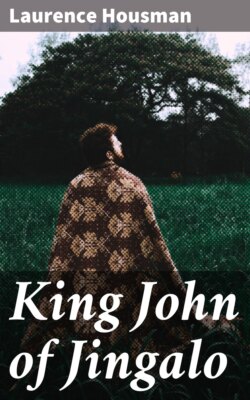Читать книгу King John of Jingalo - Laurence Housman - Страница 6
На сайте Литреса книга снята с продажи.
II
ОглавлениеTable of Contents
John of Jingalo had been in harness all his life: he had never known freedom, never been left to find his own feet, never been taught to think for himself except upon conventional lines; and these had kept him from ever putting into practice the rudimental self-promptings which sometimes troubled him. He had been elaborately instructed, but not educated; his own individual character, that is to say, had not been allowed to open out; but a sort of traditional character had been slowly squeezed into him in order to fit him for that conventional acceptance of a variety of ancient institutions (some moldering, some still vigorous) which, by a certain official and ruling class of monetarily interested persons, was considered to be the correct constitutional attitude. Monarchy, that is to say, had been interpreted to him by those who sucked the greatest amount of social prestige and material benefit from its present conditions as a "going concern"; and in that imposed interpretation deportment came first, initiative last, and originality nowhere at all.
In many respects, indeed, his training had been like that of a young girl whose parents have determined, without leaving her any choice in the matter, that matrimony is to be her single aim and the sphere of the home her outward circumference. Like a young girl whose future is thus controlled he had acquired a pleasant smattering of several social accomplishments; he had learned to speak three languages with fluency, to draw, to dance, to ride, to behave under all likely circumstances with perfect correctness, and to walk down the center of a large room with apparent ease. He had been trained, for review purposes and for the final privilege of carrying a cocked hat as well as a crown upon his coffin, in a profession which he would never be allowed to practise; and, having been "brought out" with much show and parade at an early age, had been introduced to a vast number of very important people, and dragged through a long series of social functions, which, however crowded, gave always a free floor for his feet to walk on and never presented a single back to his view. But as a result of all these crowds, with their bewildering blend of glittering toilet, deferential movement, and flattering speech, he knew no more of the inner realities of life than the young girl knows of it from a series of dances, flirtations, and afternoon teas. This polite and decorous, yet dazzling mask had been drawn between him and the actualities of existence, presenting itself to view again and again, and concealing its essential sameness in the pomp and circumstance with which it was attended. At these functions thousands of brilliant and distinguished people had bowed their well-stored brains within a few inches of his face, had exchanged with their monarch a few words of studied politeness and compliment, now and then had even laid themselves out to amuse him, but never once had they imparted to his mind an arresting or a commanding thought, never once endeavored to change any single judgment that had ever been formed for him. Not once in all the years since he came to man's estate—except occasionally with his wife and on one isolated occasion with his father—had he ever found himself involved so deeply in argument, or in any difference of opinion, as to be forced to feel himself beaten. That single discussion with his father had been closed peremptorily—parental and regal authority combining had cut it short; and as for his wife—well, she was dear, amiable, and, within her limits, sensible; but intellectually she was not his superior. Thus there had come to him a good deal of social discipline, experience of a kind, but of education in the higher intellectual sense scarcely any. He had merely been taught carefully and elaborately to take up a certain position, and in a vast number of minutely differing circumstances (mainly of social formality) to fill it or seem to fill it "as one to the manner born."
In addition he had been trained, on strictly impartial and noncommittal lines, to take an interest in politics; to have within certain narrow and prescribed limits an open mind—one, that is to say, with its orifice comfortably adapted to the stuffing process practised on kings by the great ones of the official world; and when his mind would not open in certain required directions, well, after all, it did not much matter, since in the end it made no practical difference.
Under these circumstances he would have been a mere social and official automaton had not certain defects of his character saved him. Though timid he was impulsive; he was also a little irritable, rather suspicious, and indomitably fussy in response to the call of duty. Temper, fuss, and curiosity saved him from boredom; he was conscientiously industrious, and though there was much that he did not understand he managed to be interested in nearly everything.
In the fiftieth year of his age, this monarch, amiable, affable, and of a thoroughly deserving domestic character, was destined to be thrust into a seething whirlpool of political intrigue in which, for the first time, his conscience was to be seriously troubled over the part he was asked to play. And while that wakening of his conscience was to cause him a vast amount of trouble, it was to have as enlarging and educative an effect upon his character as her first love affair has upon a young girl. From this moment, in fact, you are to see a shell-bound tortoise blossom into a species of fretful porcupine, his shell splintering itself into points and erecting them with blundering effectiveness against his enemies. And you shall see by what unconscious and subterranean ways history gets made and written.
